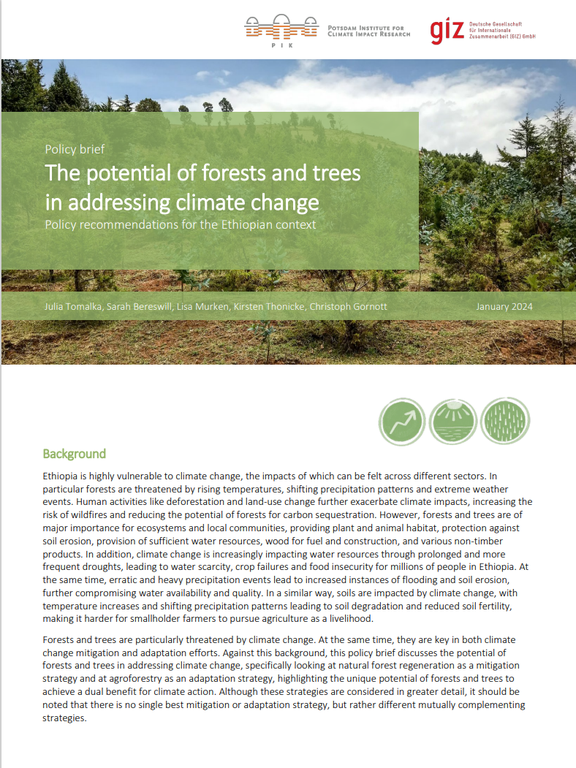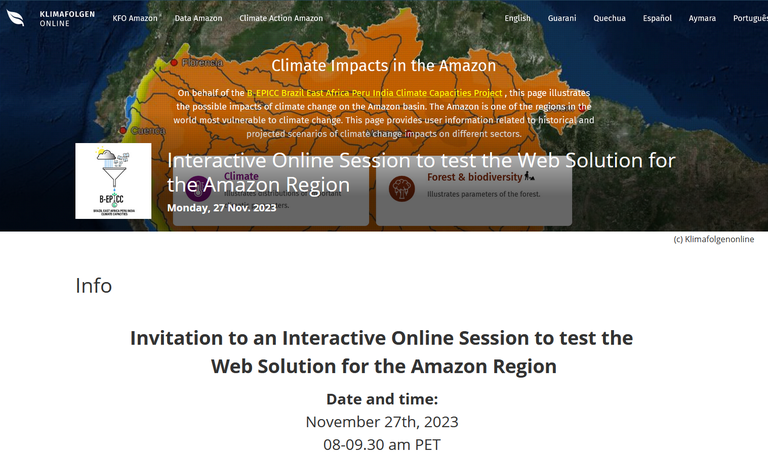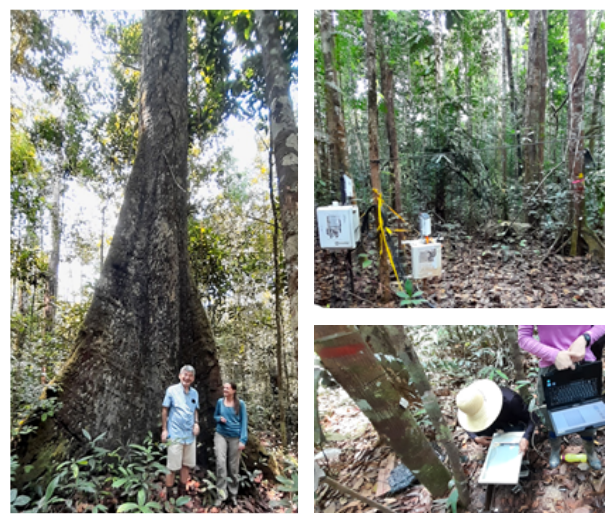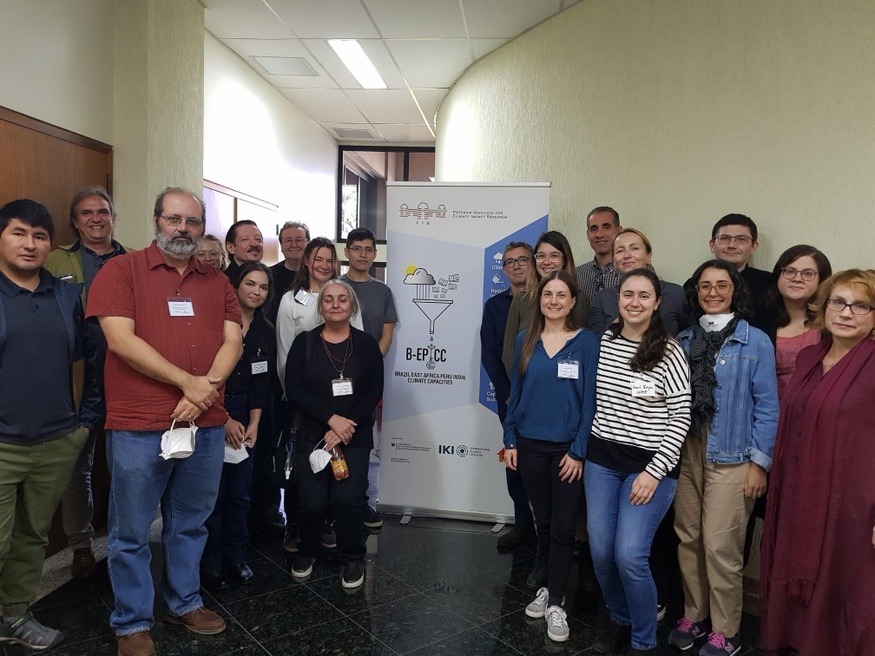Policy Brief: The potential of forests and trees in addressing climate change. Policy recommendations for the Ethiopian context.
B-EPICC scientist Sarah Bereswill, in collaboration with the AGRICA Ethiopia project and the PIK working group on Ecosystem in Transitions, published a policy brief with the GIZ.

The policy brief emphasizes the significant role of forests and trees in addressing climate change in Ethiopia. In terms of mitigation, natural forest regeneration holds promise for carbon sequestration and biodiversity restoration, especially in the highlands. However, the success of regeneration depends on protection from human activities and the assessment of extreme weather impacts. Agroforestry emerges as a key adaptation strategy, stabilizing crop yields and offering financial benefits to farmers. Policy recommendations include protecting recovering forests, involving local communities, and region-specific planning for mitigation and adaptation efforts. Incentives and transitional financial support are crucial for implementing effective strategies.
ClimateImpactsOnline: Interactive Online Session for the Amazon Region, 27th December 2023
B-EPICC invited stakeholders from Brazil and Peru to test the web solution for the Amazon Region in the web portal ClimateImpactsOnline.

The visualization working group of the B-EPICC project provides and evaluates several climate services and visualizations, integrating amongst others climate, agriculture, and biodiversity. The idea of the web portal ClimateImpactsOnline is to provide tailored interactive climate data and information to different stakeholder groups, using advanced visualization techniques.
The interactive test session took place as a video conference via Zoom on Monday, 27 November. After an introduction to the web solution for the Amazon Region, each participant explored the options of the tool and worked on small tasks. One goal of the session was to discuss further needs and changes and to collect feedback from local stakeholders in order to better customize the web portal.
B-EPICC Scientist Sarah Bereswill Visited Research Institutions in Brazil, August and September 2022
Following the B-EPICC kick-off workshop (23rd & 24th of August, 2022) in São José dos Campos, Brazil, PIK scientist Sarah Bereswill spent 10 days in Brazil to network with scientists working in the area of forest and biodiversity research. The research question B-EPICC addresses in the corresponding work package centers around the mitigation potential of secondary forests in terms of carbon sink and biodiversity recovery. For this purpose, Ms. Bereswill applies PIK’s Dynamic Global Vegetation Model ‘LPJmL-FIT’ to investigate dynamics of functional biodiversity and ecosystem services of forests under future climate scenarios.
First, Ms. Bereswill stayed at INPE (Instituto Nacional de Pesquisas Espaciais, National Institute for Space Research) and met Dr. Luiz Aragão, the head of the TREES laboratory (TRopical Ecosystems and Environmental Sciences lab). Their research focuses on different aspects of the impact of environmental change on the biodiverse Amazon rainforest ecosystems. Based on long-term measurement series from a large number of field sites and remote sensing observations across the Amazon rainforest, the forest biomass and carbon cycles of secondary forests are investigated. The data indicates that fire, repeated disturbances such as deforestation or fragmentation, and a changing climate can impede the recovery of forests and lower their carbon sink potential. The scientists discussed approaches to how the LPJmL-FIT model can, based on field observations from secondary forests in the region, specifically consider scenarios of environmental change important for the Brazilian Amazon biome.
Another focus of research at INPE is the development of future land use scenarios to enable more accurate predictions about the future of Brazil’s natural resources. Here, Dr. Celso von Randow is working with a team in the Impacts, Adaptation and Vulnerabilities Division of INPE (Divisão de Impactos, Adaptação e Vulnerabilidades, CGCT) on modeling land use change and impacts in carbon and water fluxes in Brasilian biomes. In close dialogue with stakeholders, Dr. von Randow and colleagues develop detailed projections of land use change in Brazil. To tailor simulations of future forest recovery to conditions specific to Brazil, detailed land-use scenarios that consider future trajectories across different sectors are key. Based on previous collaborations with PIK, the scientists developed ideas to combine the expertise and modeling capacities of both institutes to improve future predictions concerning Brazil’s forest resources.

Left: Dr. Celso von Randow (INPE) presents the work of his group. Center and right: impressions from INPE campus in São José dos Campos. © Sarah Bereswill
In the second part of her trip, Ms. Bereswill visited the Instituto Nacional de Pesquisas da Amazônia - INPA (National Institute of Amazonian Research) in Manaus. Ms. Bereswill was invited by Prof. Dr. Niro Higuchi from the research division Manejo Florestal (Forest Management) to visit a rainforest research station located at 60 km northwest of Manaus in the Cuieiras forest reserve. Together with scientists and students, the team around Prof. Higuchi runs long-term field campaigns to collect data on tree species composition and biodiversity, growth and biomass of primary and secondary forest on experimental sites across different environmental gradients. The scientists also discussed the belowground dynamics of forests, such as root biomass distribution, whose importance is often still underestimated in global models. Many opportunities for collaboration, joining field research and modeling approaches were identified.

Left: Ms. Bereswill with Prof. Dr. Higuchi from INPA. Right (top): Experimental set-up at a rainforest site. Right (bottom): Students of INPA measuring root systems with a portable scanner. © Sarah Bereswill
During her stay at INPA, Ms. Bereswill met Dr. Rita Mesquita from Coordenação de Dinâmica Ambiental (CDAM, Environmental Dynamics Coordination Team). Dr. Mesquita, who is also a member of the 2ndFOR (Secondary Forests) Network, shared her expertise from many years of experience in ecological research in the Amazon forests. She introduced the Bosque da Ciência (‘Forest of Science’), a 13ha area where INPA runs an environmental education program.
As B-EPICC encourages young scientists to realize a research stay at PIK, Ms. Bereswill also visited students of the Master Programme PPG-CLIAMB (Programa de Pós-Graduação em Clima e Ambiente, Graduate Program in Climate and Environment) of UEA (Universidade do Estado do Amazonas, Amazonas State University). Together with the B-EPICC colleagues focusing on hydrological modeling, we look forward to host a student of the programme at PIK soon.
B-EPICC Kick-Off Workshop, 23rd & 24th of August, 2022
The B-EPICC project was invited to the National Institute for Space Research (INPE) in São José dos Campos, Brazil from 22 to 24th August 2022 in order to conduct an inception workshop with Brazilian stakeholders and collaborators. The project commenced its second phase in 2022 and with this Brazil is joining as a key partner country. Project researchers debated their plans for the project in Brazil and commenced networking and collaboration with key stakeholders from local research and policy communities. Project work in Brazil will revolve around El Niño and Monsoon prediction, hydrological analysis, and the connection between climate change, migration and conflict, particularly in the context of land use and forest change. Importantly, with Brazil, a new research area joins the project – forests and biodiversity. Here, existing climate impact information systems will be augmented with descriptions of reforestation recovery, forest structure recovery, and biodiversity recovery. The aim is to incorporate regeneration strategies into stakeholder climate adaptation or conservation strategies. The event was opened by B-EPICC project lead, Dr Fanny Thornton and Luiz Aragão, Vice-Deputy of Coordination at INPE.
Below you can find PDF versions of the presentations that were held during the Training Workshop.
| Topic | Speaker |
|---|---|
| Monsoon |
Monsoon Prediction under Climate Change: South American Monsoon Case |
| El Niño |
|
| Climate Services in Hydrology and Water |
Climate Services and Water Disaster Resilience: Feasible Pathways for Natural Capital and Society |
| Climate Migration (Online) |
|
|
Knowledge Transfer & Capacity Building:
|
Ms. Mechthild Becker (PIK) |
| Climate Services and Forest & Biodiversity |
Modelling Forests and Biodiversity under Climate Change
Dynamics of Forest Carbon from Environmental Change in Amazônia
|
| Visualization ClimateImpactsOnline |
|







